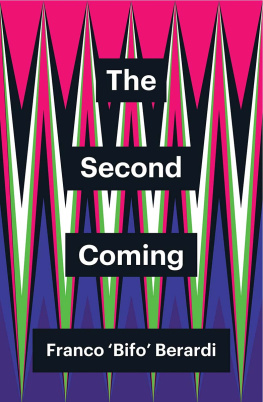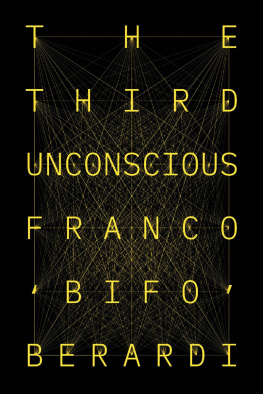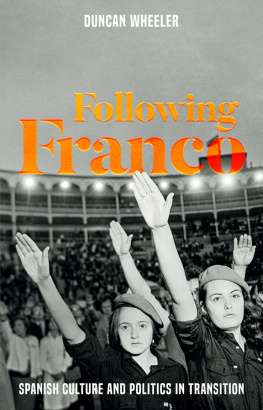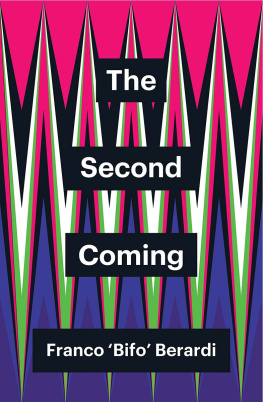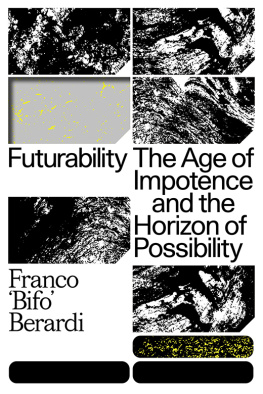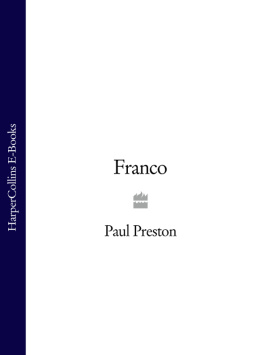Franco Berardi - The Second Coming
Here you can read online Franco Berardi - The Second Coming full text of the book (entire story) in english for free. Download pdf and epub, get meaning, cover and reviews about this ebook. year: 2019, publisher: Polity, genre: Politics. Description of the work, (preface) as well as reviews are available. Best literature library LitArk.com created for fans of good reading and offers a wide selection of genres:
Romance novel
Science fiction
Adventure
Detective
Science
History
Home and family
Prose
Art
Politics
Computer
Non-fiction
Religion
Business
Children
Humor
Choose a favorite category and find really read worthwhile books. Enjoy immersion in the world of imagination, feel the emotions of the characters or learn something new for yourself, make an fascinating discovery.
- Book:The Second Coming
- Author:
- Publisher:Polity
- Genre:
- Year:2019
- Rating:4 / 5
- Favourites:Add to favourites
- Your mark:
- 80
- 1
- 2
- 3
- 4
- 5
The Second Coming: summary, description and annotation
We offer to read an annotation, description, summary or preface (depends on what the author of the book "The Second Coming" wrote himself). If you haven't found the necessary information about the book — write in the comments, we will try to find it.
The Second Coming — read online for free the complete book (whole text) full work
Below is the text of the book, divided by pages. System saving the place of the last page read, allows you to conveniently read the book "The Second Coming" online for free, without having to search again every time where you left off. Put a bookmark, and you can go to the page where you finished reading at any time.
Font size:
Interval:
Bookmark:

Theory Redux
Series editor: Laurent de Sutter
Published Titles
Franco Berardi, The Second Coming
Alfie Bown, The Playstation Dreamworld
Laurent de Sutter, Narcocapitalism
Roberto Esposito, Persons and Things
Graham Harman, Immaterialism
Helen Hester, Xenofeminism
Sreko Horvat, The Radicality of Love
Dominic Pettman, Infinite Distraction
Nick Srnicek, Platform Capitalism
Franco Bifo Berardi
polity
Copyright Franco Berardi 2019
The right of Franco Berardi to be identified as Author of this Work has been asserted in accordance with the UK Copyright, Designs and Patents Act 1988.
First published in 2019 by Polity Press
Polity Press
65 Bridge Street
Cambridge CB2 1UR, UK
Polity Press
101 Station Landing
Suite 300
Medford, MA 02155, USA
All rights reserved. Except for the quotation of short passages for the purpose of criticism and review, no part of this publication may be reproduced, stored in a retrieval system or transmitted, in any form or by any means, electronic, mechanical, photocopying, recording or otherwise, without the prior permission of the publisher.
Extract from Another Time, Copyright 1940 by W.H. Auden, renewed
Reprinted by permission of Curtis Brown, Ltd.
ISBN-13: 978-1-5095-3485-2
A catalogue record for this book is available from the British Library.
Library of Congress Cataloging-in-Publication Data
Names: Berardi, Franco, author.
Title: The second coming / Franco Berardi.
Description: Cambridge ; Medford, MA : Polity Press, 2019. | Series: Theory redux
Identifiers: LCCN 2018027017 (print) | LCCN 2018041502 (ebook) | ISBN 9781509534852 (Epub) | ISBN 9781509534838 (hardback) | ISBN 9781509534845 (pbk.)
Subjects: LCSH: End of the world--Philosophy. | Civilization, Modern--Philosophy.
Classification: LCC BL503 (ebook) | LCC BL503 .B47 2019 (print) | DDC 303.4--dc23
LC record available at https://lccn.loc.gov/2018027017
The publisher has used its best endeavours to ensure that the URLs for external websites referred to in this book are correct and active at the time of going to press. However, the publisher has no responsibility for the websites and can make no guarantee that a site will remain live or that the content is or will remain appropriate.
Every effort has been made to trace all copyright holders, but if any have been overlooked the publisher will be pleased to include any necessary credits in any subsequent reprint or edition.
For further information on Polity, visit our website: politybooks.com
Those who wage war against chaos will be defeated because chaos feeds upon war.
Chaos does not exist in nature, it is not an objective reality: it is the relation between the human mind and the speed of events that are relevant to our physical and psychological survival.
If we feel as though we are living in conditions of chaos, this means that our minds are unable to emotionally process and rationally decide about events whose speed is intensifying, about proliferating nervous stimulation.
What is the relation between chaos and conscious subjectivity? In the domain of Enlightenment philosophy, conscious subjectivity was expected to reduce chaos to rational order. But today all attempts to govern chaos seem doomed to fail, as info-nervous stimulation has intensified beyond the limits of conscious processing.
Chaos is the measure of the complexity of the world in relation to the capacities of intellectual reduction. From a different angle, chaos is the measure of the excessive density of the infosphere in relation to the psychosphere.
As chaos is fed by war, every attempt to overcome chaos by waging war against it is doomed to failure: fighting terrorism ends up reinforcing it, security campaigns result in increasing insecurity, and legal battles against fake news only lead to the multiplication of shitstorms.
So, finally, what should be done in situations of chaos? Lets read what Deleuze and Guattari say about the subject: the struggle against chaos does not take place without an affinity with the enemy.
When chaos invades the mind and swallows up social behaviour, we should not be afraid of it, and we should not try to subjugate chaos to any order whatsoever. It does not work, as chaos is stronger than order. So the best thing to do is to make friends with chaos. Only inside the whirlwind will the clue to the new rhythm be found.
Wu wei.
It may be that Marxs famous eleventh thesis on Feuerbach the central pillar of the revolutionary methodology of the last century and a half simply needs to be overturned. Marx wrote there that Philosophers have hitherto only interpreted the world in various ways; the point is to change it and the philosophers of the last century tried to do so. The results are catastrophic.
The philosophers task is not to change the world the world continually changes with no need of philosophers. The philosophers task is to interpret the world, that is, to capture its tendency and above all to enunciate the possibilities inscribed therein.
This is the philosophers primary task: deciphering possibilities. The politicians eye does not see the possible, being attracted instead by the probable. And the probable is no friend of the possible: the probable is the gestalt that allows us to see what we already know, and at the same time prevents us from seeing what we do not know and yet what is right there, in front of our eyes.
Interpretation is the condition for finding the thread that helps us untie the knot, the thread that gives us the ability to escape the labyrinth.
The knot is capitalism, and my thread is the tendency towards reduction of necessary labour time thanks to the increasing connection of the general intellect. How to translate this tendency into an active process of labour-time reduction? This is my labyrinth, and in order to wriggle our way out of the labyrinth, interpretation is needed.
In The Fragment on Machines, Marx emphasizes not action, but interpretation. He wants to unfold what is implied, and to transcribe what is inscribed, in the present: the possible. And he reads its tendency by inspecting the entrails of the relationship between knowledge, technology and labour time. This tendency we have to make visible, by force of interpretation.
This book is a sort of philosophical account of the year 2017, when chaos, pain and fakery sprawled over planet Earth.
The crumbling of the neoliberal illusion paved the way for the comeback of the obsession with identity politics, but the effects of the illusion, entrenched in the dictatorship of finance, outlived the disillusionment.
Even if the majority of people have realized that the dictatorship of finance has shocked Western democracy and pushed many of the population into destitution and despair, finance is not relaxing its grip.
Aggressiveness, brutality, racism and war are the outcome of the deadlock.
A blackout on sensibility is one effect of this social stranglehold. Idiocy is spreading worldwide as a revolt against the mathematical rationality of financial plundering: a blackout on reason, as revenge does not listen to reasons.
The end of history, which once upon a time was expected to result from the realization of historical Reason (
Next pageFont size:
Interval:
Bookmark:
Similar books «The Second Coming»
Look at similar books to The Second Coming. We have selected literature similar in name and meaning in the hope of providing readers with more options to find new, interesting, not yet read works.
Discussion, reviews of the book The Second Coming and just readers' own opinions. Leave your comments, write what you think about the work, its meaning or the main characters. Specify what exactly you liked and what you didn't like, and why you think so.

